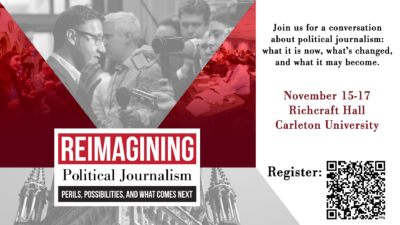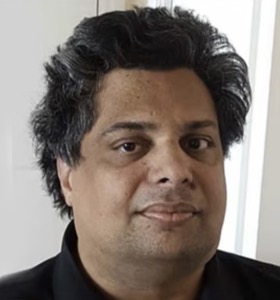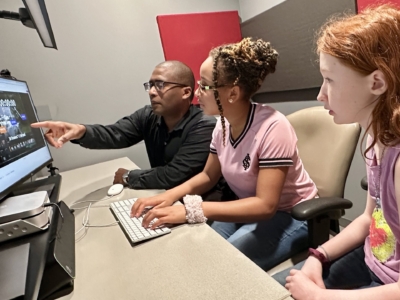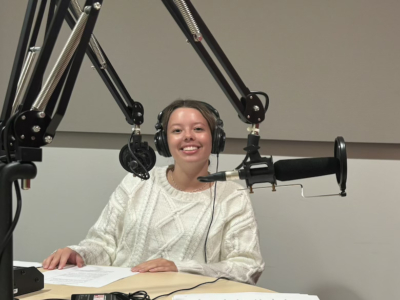Polarization. Upheaval. Animosity. Rage.
The words that pop to mind when describing the current state of political journalism in Canada aren’t pretty. That’s why a group of journalism educators interested in the enterprise — and disturbed by some of the trending directions of Canadian politics and the press — has convened a national conference at Carleton University Nov. 15-17 to hear from dozens of reporters, columnists, fellow academics and others engaged in the democratic life of the country and to begin reimagining political journalism in Canada.
 The seedbed for the conference — Reimagining Political Journalism: Perils, Possibilities and What Comes Next — was a year-long series of conversations between Carleton University journalism professor Adrian Harewood, a long-time CBC Ottawa radio and television news host, and fellow journalism educators Chris Dornan (Carleton), Kathryn Gretsinger (UBC) and Andy Clarke (Loyalist College), all of whom also have extensive backgrounds in the profession.
The seedbed for the conference — Reimagining Political Journalism: Perils, Possibilities and What Comes Next — was a year-long series of conversations between Carleton University journalism professor Adrian Harewood, a long-time CBC Ottawa radio and television news host, and fellow journalism educators Chris Dornan (Carleton), Kathryn Gretsinger (UBC) and Andy Clarke (Loyalist College), all of whom also have extensive backgrounds in the profession.
As a prelude to the November conference, an online panel discussion hosted by Harewood was held in June 2024 and posted on YouTube. The key themes were introduced by Prof. Harewood and a preliminary discussion featured insights from Vancouver-based author, political theorist and columnist David Moscrop, Winnipeg-based author, professor and columnist Niigaan Sinclair and Montreal-based anthropologist, podcaster and columnist Emilie Nicolas.
In setting the stage for discussion, Harewood compared the temper of our times to previous eras in Canadian history and argued that “the very nature of our politics has changed” in recent years.
“It’s become more toxic, more vicious, more dyspeptic, and more hysterical,” Harewood observed. “Every day we see elected officials subjected to shocking levels of abuse, even physical threats. It seems our politicians are more prone to playing on prejudices, fears, and hatreds for political gain, without conscience, and with little regard for the larger consequences of doing so.”
The conference, which is taking place in the Richcraft Hall home of Canada’s oldest journalism school, brings together more than 35 of the leading practitioners and observers of political journalism in the country. The discussion will unfold less than two weeks after a historic U.S. election decisively won by former U.S. president Donald Trump, who has routinely characterized mainstream American journalists as “enemies of the people,” and mused in the latest campaign about reporters being killed in the crossfire if he were targeted again by an assassin.
Canadian politics, too, has seen rising animosity towards many members of the news media. Federal Conservative leader Pierre Poilievre has made pledges to defund and dismantle the CBC — one of the country’s prime sources of journalism and top employers of news professionals — and labelled all news organizations benefiting from federal funding for journalism part of a “propaganda” machine of the Liberal government.

Jeet Heer, a national affairs correspondent for The Nation, delivers Friday’s keynote
At this fraught moment, Reimagining Political Journalism will kick off on the evening of Friday, Nov. 15 with a keynote address from the influential Canadian journalist Jeet Heer, national affairs correspondent for New York City-based The Nation and host of the weekly Nation podcast, “The Time of Monsters.” He’ll be joined for a post-keynote conversation by author, journalist and adjunct Carleton professor Andrew Cohen — a veteran Canadian political columnist specializing in U.S.-Canada relations — and Sarah St-Pierre, a current Master of Journalism student at Carleton and former editor of the McGill University student publication Catalyst.
The conference agenda over the following two days features panel discussions across a range of themes — strengthening youth engagement in political journalism, amplifying Indigenous voices, the challenge of teaching political reporting and much more.
Along with Nicolas, Moscrop and Sinclair, panelists include CBC senior writer and political affairs columnist Aaron Wherry, author of a best-selling book about Prime Minister Justin Trudeau’s years in power; The Narwhal’s Ontario correspondent Emma McIntosh, former Toronto Star columnist Desmond Cole, an award-winning journalist, author of The Skin We’re In and blogger at yeseverthing.ca; former journalist Amira Elghawaby, the Canadian government’s special representative on combatting Islamophobia; and Globe and Mail columnist Tanya Talaga, author of the 2017 bestseller Seven Fallen Feathers and the newly published The Knowing, as well as a past winner of the Shaughnessy Cohen Prize For Political Writing.



